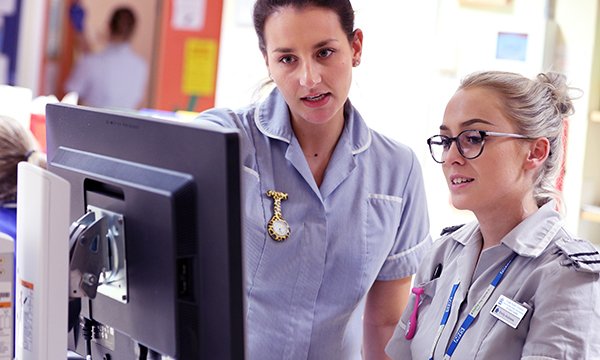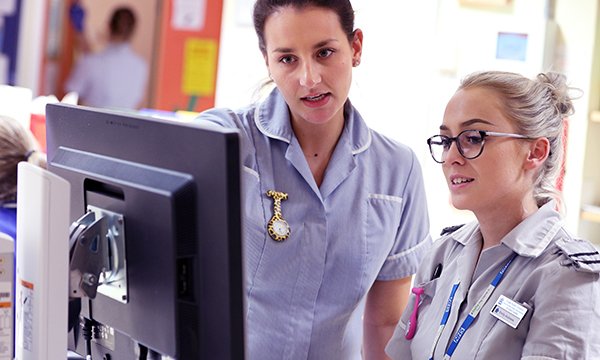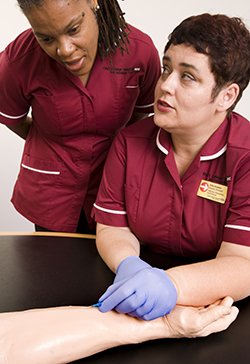New approach to nurse education affects every registrant – but are you ready?

NMC’s education standards take a fresh approach to supervision, assessment and nurse leadership
- Many nurses remain unaware that new education standards will change the working lives of all registrants, not just preregistration students
- Students on clinical placement will no longer have mentors – instead, all registrants will be expected to supervise and support students’ practice education
- The reforms attempt to prepare nurses for the demanding environment of modern nursing and nurture them as leaders from day one

With fundamental changes to how nursing students are trained coming in September, the effects will be felt across the profession.
‘It’s massive,’ says RCN professional lead for practice-based learning Jean Christensen. ‘This is the biggest change to the way nurse education is delivered, certainly in my memory.’
NMC’s education reforms are not just for nursing students
To help prepare all sectors of the profession for the Nursing and Midwifery Council’s (NMC) wide-ranging reforms, the RCN organised a series of regional workshops in England.
These sessions attracted more than 200 people in total, including nursing students, registrants in the NHS and independent sectors, and those working in education.
‘We wanted to raise awareness and ask what we could do to support them to implement the standards in the practice setting,’ explains Dr Christensen. ‘This was a very interested and motivated audience, but there was still a lot of confusion.
‘A lot of nurses felt the new standards were for students, not them. They didn’t realise they had an impact on every single nurse, midwife and nursing associate.’
Supervision of students is to be split from assessment
In particular, there were gaps in registrants' understanding of the new roles of practice supervisor, assessor and academic assessor, which form a key aspect of the fresh approach.
This separates support and supervision from assessment, and replaces the existing system in which students were expected to spend 40% of their placement with one trained mentor. Practically, it means many more registered practitioners will be involved in supporting students.

‘It’s now the responsibility of all nurses, midwives and nursing associates to be a practice supervisor. It’s a really big difference,’ says Dr Christensen. ‘Some people are frightened of these changes, but there’s no need to feel that way.
‘A lot of them will be very positive. It’s about understanding what they are and learning how to work with them, gaining the knowledge to be able to deliver well.’
Can staff say no? ‘Lots of people have asked that question,’ says Dr Christensen. ‘It’s in the Code so it is an expectation, but while it’s seen as new, I think it has always been this way – if you’re a registered nurse, or even a third-year student, you supervise those who have less experience. It’s not an onerous thing that is being asked.’
‘Not having a one-on-one mentor will be a big change, but more objective’

For Rachael Palmer, not having a mentor as she goes into her third year of an adult nursing course in September will be a major change. ‘It’s a big adaptation, especially for those of us in our final year, when you’re so close to qualifying and with all the expectations that brings,’ says Ms Palmer, who is also a course representative at Plymouth University.
‘We’re used to the one-on-one model, where you really get to know someone. Now it will be much more objective, with assessors being someone we’ve not had a relationship with.’
Lack of continuity
A lack of continuity may also prove challenging, she says. ‘Practice supervisors can change day to day and also be any kind of healthcare professional,’ she says. ‘My last placement was on a busy acute ward and I liked having a mentor, changing my shift to work with her as much as possible. We got to know each other very well, building trust.’
There will be differences between those qualifying now and those under the new system, says Ms Palmer. ‘The new programme and standards have a much greater depth of learning in some areas. Students may have knowledge we don’t, as they are educated to a higher level. It could change the dynamic.’
Clinical placements outside the NHS
In the past, not having sufficient trained mentors has sometimes been a barrier to students experiencing practice outside more conventional NHS settings. ‘It was difficult for smaller organisations, but now it should be easier to have placements in GP surgeries, care homes and the independent sector,’ says Dr Christensen.
‘We need to provide a lot of support for staff, helping them to upskill in new proficiencies’
Jean Christensen, RCN professional lead for practice-based learning
‘Good placements outside the NHS are vital. This should give students a better feel for what it means to be a nurse.’
Although it’s a UK-wide initiative, the standards begin in September in England, followed by the systems in Scotland, Wales and Northern Ireland. ‘They will have an extra year to prepare and they can learn from our experiences,’ says Dr Christensen.
In England, the approach is likely to be patchy initially. ‘Some will switch over completely, while others will run both the old and the new side by side. It will be a bit messy,’ she admits.
‘Let’s see how protected time for assessing and supervising works in practice’

As a dual adult and mental health nursing student, Amy Fancourt welcomes the parity of esteem the new standards offer the fields of nursing. ‘In the past it was down to individual universities to establish how much mental health they would teach adult nursing students,’ she says.
‘It meant a great deal of disparity. I don’t believe we should have general nurses, but there should be more cross-education. This is a step in the right direction.’
Students are excited by the new system, says Ms Fancourt, who is student member of RCN council. ‘The new standards are much more suitable for the modern nurse,’ she says. ‘I’m cautiously optimistic, but as with any changes, there will be kinks that need ironing out.’
‘I’m worried about getting everything signed off’
Now about to enter her third year, she will be continuing on her current programme. ‘I’m worried about getting everything signed off, as it can already be a bit of a struggle,’ says Ms Fancourt.
‘There is also supposed to be protected time for those who are assessing and supervising, but I’ll be interested in how that plays out in practice. Everywhere is short-staffed, so sitting down with a student for an hour and a half in an already busy 12-hour shift may well be wishful thinking in a lot of places.’
And while the NMC is placing greater emphasis on using simulation in teaching, it may not be so applicable in mental health. ‘You can practise a wound dressing on a dummy, but a lot of people aren’t comfortable using simulation in mental health,’ says Ms Fancourt. ‘The best place to gain experience is by working within it.’
Common misunderstandings about what the new standards will mean

advanced are to be taught to all
students Picture: David Gee
Developing resources is a key aspect of the RCN’s role, including good practice case studies. The RCN’s workshops revealed several myths and misunderstandings the college is keen to dispel. Among them was that students would graduate as fully trained prescribers. ‘It’s not the case,’ says Dr Christensen. ‘They will be “prescribing-ready”, but that means ready to have further training once they’ve qualified.’
Another concern is that registered nursing staff will be expected to sign-off on competencies they haven’t been trained in themselves. For example, the new standards require all nursing students to be able to demonstrate they can carry out specific procedures, such as chest auscultation, venepuncture and cannulation – once deemed advanced nursing skills.
RCNi Learning can support your practice
‘It has caused a lot of anxiety for existing staff, who fear they won’t be able to meet these expectations,’ says Dr Christensen. ‘It’s a justifiable concern, but it’s important to remember they don’t have to sign these off themselves. The NMC says you can use other registered health and social care staff as supervisors, with non-registered staff supporting them.’
In practice, for example, a phlebotomist could be involved in training a student to take blood, she says. This strengthens the case for nurses being able to readily access ways of improving their own competencies.
‘We need to provide a lot of support for staff, helping them to upskill in new proficiencies, if they’re relevant to their post,’ says Dr Christensen. ‘Otherwise those nurses who don’t have access to professional development opportunities are going to feel very disillusioned. It needs to be available for all.’
‘Lack of a mentor might make students more independent’

The new standards won’t be implemented until next year at Bangor University in Wales, but there have already been meetings with stakeholders, including students, to discuss the new curriculum. ‘It will be quite different to how it is now,’ says Kayte Powell, who completed her adult nursing degree in August.
While she admits she had some initial reservations, she now welcomes the new approach. ‘There is much more learning on the job and assessing clinical skills in practice,’ says Ms Powell. ‘It’s good because that’s where you feel very unsure at first. You learn the basics at university, but most of your clinical skills come from placements.’
‘I worried I would be outpaced by graduates who come after me’
She also feels reassured she won’t be outpaced by those who qualify after her. ‘At first I thought they’d graduate knowing much more than me,’ says Ms Powell. ‘But the same courses are available to us as newly qualified nurses, so I don’t think there will be that much difference.’
She is interested in how new students will cope without mentors. ‘In one short placement of two weeks, I didn’t have a mentor,’ says Ms Powell. ‘At first, I felt completely lost, but it made me sit down and think about what I really wanted from that placement.
‘I could then find it, getting to work with a wider variety of healthcare professionals. I think it might help to make you a more independent learner.’
Preparations in higher education
Middlesex University began preparing for the new standards two and a half years ago, with a fresh curriculum validated in March.
Director of programmes in adult nursing Mariama Seray-Wurie welcomes the emphasis on assessing both physical and mental health, as well as universities being more involved in assessing practice, and the focus on leadership.
‘Nursing associates are doing much of what we would have been teaching students to do in their first and second years,’ she says. ‘Now there are more expectations on nurses, who have greater responsibilities. Students need to be able to take on roles as leaders from the point of registration. I feel it’s helping us to move nursing forward.’

standards aim to support that expectation Picture: iStock
The university’s current students will finish their degrees in line with the old standards, but they are being kept informed about the changes. ‘We’re trying to upskill them,’ says Ms Seray-Wurie. ‘We didn’t want them to feel that the new students will be getting a better deal.’
As a result, third-year students are being taught about venepuncture and cannulation and the university has also introduced topics such as care of the deteriorating patient for those in their final year.
‘We are trying to make them more aware, so they don’t feel left out. It’s very easy, when a new programme starts, to forget about the ones that are already running. Some of our students still have two more years to go,’ she says.
Collaboration between universities and nurses’ employers
At Imperial College Healthcare NHS Trust in London, which employs just under 4,500 nurses, they have already introduced a whole programme of training. The first stage supports existing mentors in the transition to the new roles of supervisor and assessor.
‘Eventually everyone will receive training to be a supervisor,’ says lead nurse for education Jan Goldsmith. ‘The Code is very clear that every nurse and midwife is expected to contribute to student learning. It’s a change, but one most agree is how it should be. This is our future workforce and we should all embrace being part of their learning.’

students procedures Picture: Charles Milligan
In London, there has been a collaborative approach to the new standards. ‘We have a pan-London practice learning group,’ explains Ms Goldsmith. ‘Higher education institutions and trusts are working together to produce resources and frameworks, including a website with e-learning. Most will be using similar training.’
At Imperial, they are ensuring they have adequate trained staff to help students learn the required procedures. ‘We’ve just done a comprehensive mapping of all the services where we currently place students,’ says Ms Goldsmith.
‘Simulation is going to have a key role in rehearsing some of these skills. We’re working closely with our partnering universities to see where it might bridge some of the gaps.’
Find out more
- NMC Education and training standards framework for nursing and midwifery education
- How practice-based learning is changing (RCN)
Lynne Pearce is a health journalist
